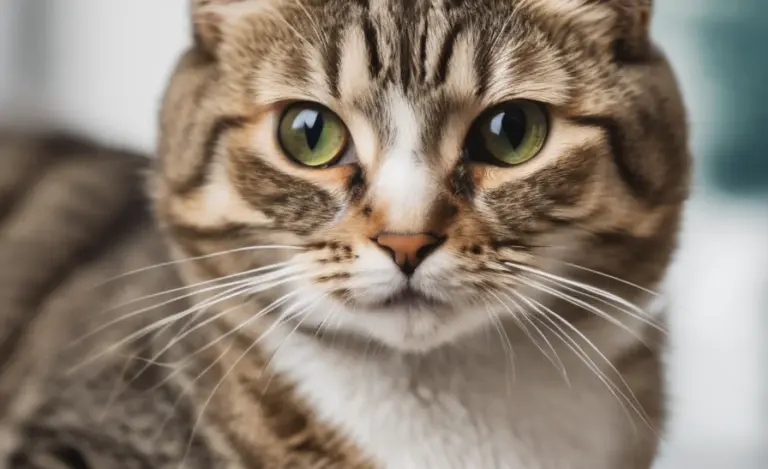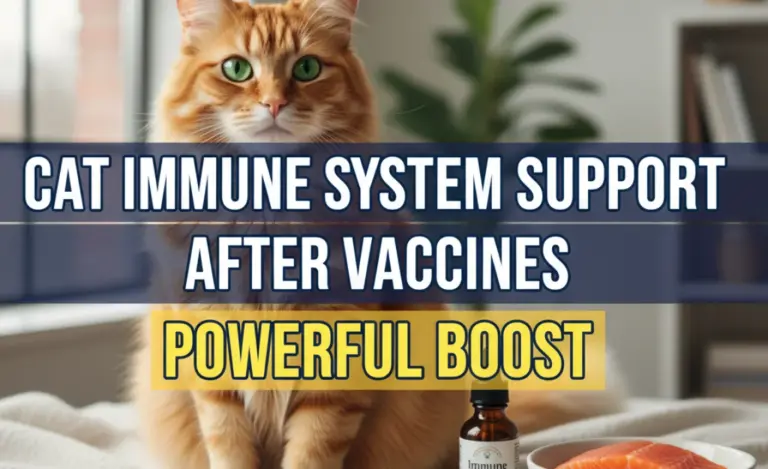Cat Vaccine Safety Tips: Keep Your Kitten Safe!
Have you ever wondered how to keep your cat safe? Vaccines are a big part of that. But are cat vaccines always safe? Knowing cat vaccine safety tips can help you protect your furry friend.
Think of Lily, a playful kitten. Her owners wanted to keep her healthy. They asked the vet about the safest way to vaccinate her. They learned some important things. These tips made Lily’s vaccination experience much better.
This article will give you cat vaccine safety tips. You will learn how to make sure your cat stays healthy and happy. We will cover what to ask your vet. We will also talk about watching for any problems after the shot.
Key Takeaways
- Always discuss your cat’s health history with the vet before any vaccines.
- Understand the benefits and risks of each vaccine for your cat.
- Monitor your cat for any adverse reactions after vaccination.
- Follow all cat vaccine safety tips to minimize potential side effects.
- Ensure your cat gets the right vaccines at the correct intervals for best protection.
Understanding Cat Vaccine Safety Tips
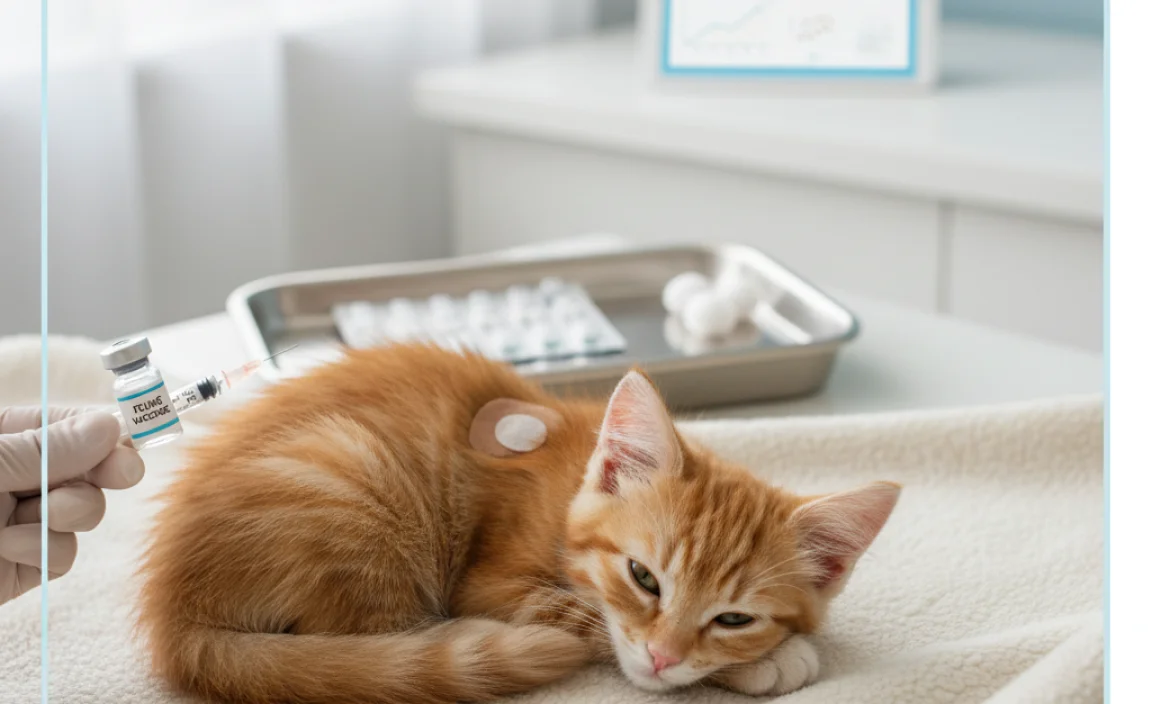
Keeping your cat safe during vaccination is very important. Cat vaccines help protect against serious diseases. But like any medicine, vaccines can sometimes cause side effects. Knowing cat vaccine safety tips helps you reduce these risks. It starts with choosing the right vaccines. Not all cats need the same shots. Indoor cats have different risks than outdoor cats. Talk to your vet about what is best for your cat’s lifestyle. Also, make sure your vet knows your cat’s health history. Allergies or past reactions can affect vaccine safety. Watch your cat closely after the vaccination. Look for any signs of a problem. These can include swelling, itching, or trouble breathing. Contact your vet right away if you see anything unusual. By following these tips, you can help keep your cat safe and healthy.
- Talk to your vet about the right vaccines.
- Share your cat’s full health history.
- Watch for any side effects after the shot.
- Know the signs of an allergic reaction.
- Keep your cat calm and comfortable.
Remember, vaccinations are a key part of keeping your cat healthy. They protect against diseases that can make your cat very sick. By understanding cat vaccine safety tips, you play a big role in keeping your furry friend safe. Work closely with your vet. Together, you can make the best choices for your cat’s health. Make sure to write down any questions you have before the visit. This will help you remember everything you want to ask. And don’t be afraid to call your vet if you have concerns after the vaccination. Your vet is there to help you keep your cat happy and healthy. Following safety tips ensures your cat gets the protection they need with minimal risk.
Why Knowing Your Cat’s History Matters
Have you ever wondered why vets ask so many questions? Your cat’s health history is like a puzzle. It helps the vet understand your cat’s needs. Knowing about past illnesses or allergies is very important. These things can affect how your cat reacts to a vaccine. For example, a cat with a sensitive stomach might need a special type of vaccine. Or a cat with allergies might need extra monitoring after the shot. The vet will also ask about your cat’s lifestyle. Is your cat an indoor cat or an outdoor cat? Outdoor cats are more likely to be exposed to certain diseases. So, they might need different vaccines than indoor cats. Sharing all this information helps the vet choose the safest and most effective vaccines for your cat. It also helps them know what to watch out for after the vaccination.
Choosing the Right Vaccines for Your Cat
Imagine you are packing a suitcase for a trip. You would pack different things depending on where you are going. Choosing the right vaccines for your cat is similar. Your vet will consider your cat’s lifestyle and risk factors. Core vaccines are recommended for all cats. These protect against common and serious diseases like rabies and feline distemper. Non-core vaccines are only needed for some cats. These depend on your cat’s lifestyle and where you live. For example, if your cat goes outside, they might need a vaccine for feline leukemia virus (FeLV). This virus is spread through contact with other cats. Your vet will help you decide which vaccines are best for your cat. They will explain the benefits and risks of each vaccine. This way, you can make an informed decision about your cat’s health.
What to Watch for After Vaccination
Imagine your cat just got a vaccine. Now, it is your job to be a detective. You need to watch for any clues that something might be wrong. Most cats have no problems after a vaccine. But sometimes, cats can have mild side effects. These can include feeling tired or having a slight fever. These side effects usually go away within a day or two. More serious side effects are rare but can happen. These can include swelling at the injection site or an allergic reaction. Signs of an allergic reaction include difficulty breathing, hives, or vomiting. If you see any of these signs, call your vet right away. It is always better to be safe than sorry. By watching your cat closely, you can catch any problems early and get them the help they need.
Fun Fact or Stat: Did you know that rabies vaccines are required by law in most places to protect both pets and people?
Minimizing Risks of Vaccine Reactions
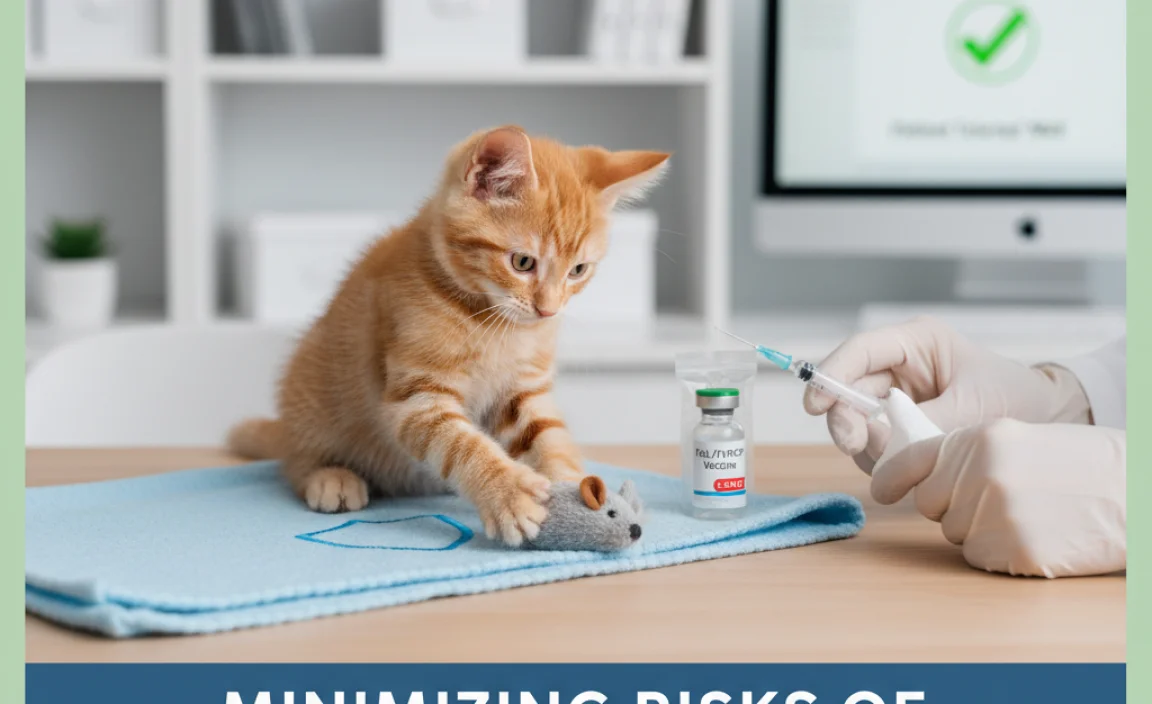
Cat vaccine safety tips also focus on minimizing risks. Vaccine reactions can worry pet owners. But understanding how to reduce these risks helps. Vets often recommend splitting vaccines. This means giving different vaccines at separate times. This can reduce the chance of a strong reaction. Your vet might also suggest giving your cat an antihistamine before the vaccine. This can help prevent allergic reactions. Always tell your vet about any past reactions your cat has had. This information is important for making safe choices. After the vaccination, keep your cat calm. Avoid stressful situations that could make them more reactive. Watch the injection site for any swelling or redness. Contact your vet if you notice anything unusual. By taking these steps, you can help minimize the risks of vaccine reactions and keep your cat safe.
- Ask about splitting vaccines.
- Discuss antihistamines with your vet.
- Keep your cat calm after the shot.
- Watch for swelling or redness.
- Report any past reactions to the vet.
Vaccine reactions can be scary, but they are usually rare. Most cats do just fine after getting their shots. Remember, vaccines protect your cat from serious diseases. The benefits of vaccination usually outweigh the risks. Talk to your vet about your concerns. They can help you understand the risks and how to minimize them. They can also answer any questions you have about cat vaccine safety tips. By working together, you and your vet can keep your cat healthy and protected. Remember, being informed is the best way to ensure your cat’s safety during and after vaccinations. Knowing what to expect and what to look for can make a big difference.
Why Splitting Vaccines Can Help
Have you ever tried to carry too many things at once? It can be hard to balance everything. Giving multiple vaccines at the same time can be similar for your cat’s body. Splitting vaccines means giving different vaccines at different appointments. This can reduce the stress on your cat’s immune system. It gives their body more time to respond to each vaccine. This can lower the risk of a reaction. Your vet can help you decide if splitting vaccines is right for your cat. It depends on their individual needs and health history. It’s like giving your cat’s immune system a chance to catch its breath between each challenge.
The Role of Antihistamines
Imagine your body is like a castle. Sometimes, invaders try to attack. Allergies are like when the castle guards overreact. They attack things that are not really dangerous. Antihistamines are like peacekeepers. They calm down the guards and prevent them from overreacting. In cats, antihistamines can help prevent allergic reactions to vaccines. They work by blocking histamine, a chemical that causes allergy symptoms. Your vet might recommend giving your cat an antihistamine before a vaccine. This can be especially helpful if your cat has a history of allergies or reactions. Always follow your vet’s instructions carefully. They will tell you the right dose and when to give the antihistamine. It’s like giving your cat’s body a little extra help to stay calm and relaxed.
Managing Stress During Vaccination
Think about going to the doctor. If you are nervous, it can make the experience worse. The same is true for cats. Stress can affect how your cat reacts to a vaccine. A calm cat is less likely to have a reaction. There are many ways to reduce stress during vaccination. Use a calming carrier. Bring your cat’s favorite blanket or toy. Speak in a soothing voice. Ask your vet to use a gentle approach. Some vets offer treats or distractions during the shot. The goal is to make the experience as positive as possible. A relaxed cat is a safer cat. By managing stress, you can help minimize the risk of vaccine reactions.
Fun Fact or Stat: Studies show that cats experience less stress when transported in a familiar carrier with a soft blanket!
Understanding Common Vaccine Side Effects
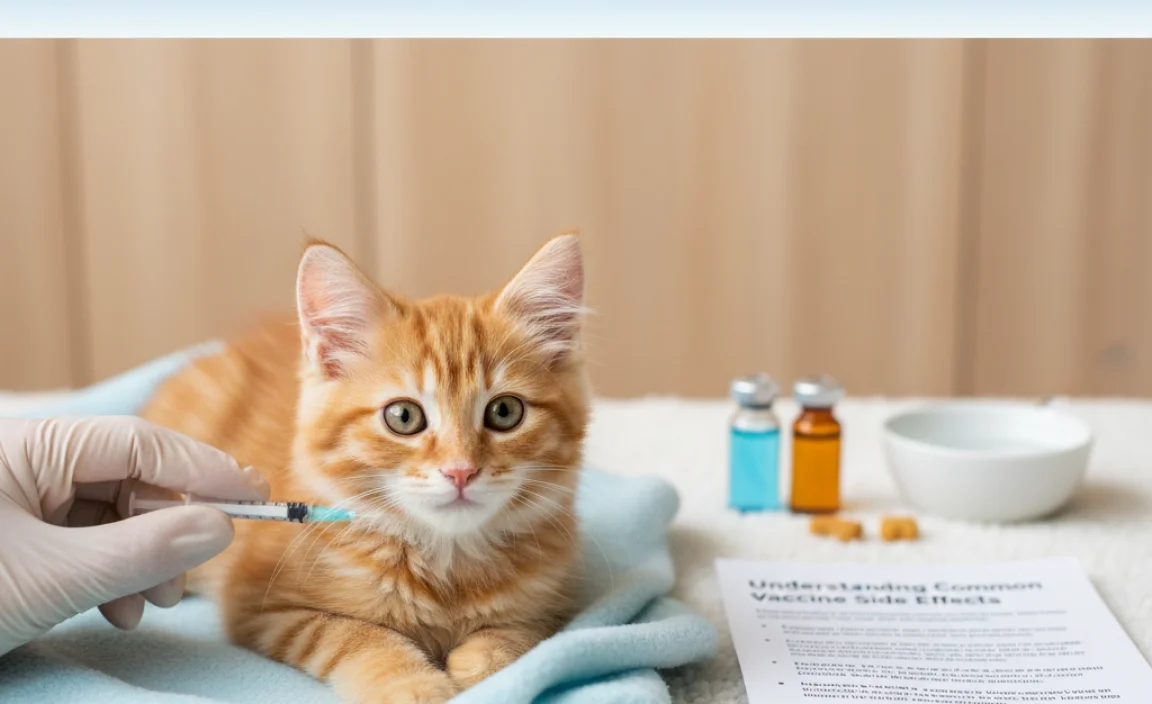
Knowing what to expect helps with cat vaccine safety tips. Vaccines can cause some side effects. These are usually mild and don’t last long. Common side effects include feeling tired or having a slight fever. Your cat might also have some soreness at the injection site. This is normal and should go away within a day or two. Some cats might lose their appetite for a short time. Make sure your cat has fresh water and a comfortable place to rest. If the side effects last longer than 48 hours, call your vet. More serious side effects are rare. These can include vomiting, diarrhea, or difficulty breathing. If you see any of these signs, seek veterinary care right away. Being aware of these potential side effects helps you know when to worry and when to relax.
- Mild fever is a common side effect.
- Soreness at the injection site can occur.
- Loss of appetite may happen briefly.
- Serious side effects are rare but possible.
- Contact your vet if you are concerned.
It is important to remember that vaccines are designed to protect your cat. The benefits of vaccination usually outweigh the risks of side effects. Most side effects are mild and temporary. Think of it like getting a little cold after a flu shot. It is a sign that your body is building immunity. Talk to your vet if you have any concerns about vaccine side effects. They can provide you with more information and reassurance. They can also help you manage any side effects that do occur. By understanding what to expect, you can be prepared and help your cat through the vaccination process. Remember, your vet is your best resource for information about cat vaccine safety tips.
What to Do If Your Cat Seems Tired
Imagine you just ran a long race. You would probably feel tired and want to rest. Your cat might feel the same way after a vaccine. Feeling tired is a common side effect. It is a sign that your cat’s immune system is working. The best thing to do is let your cat rest. Provide a quiet and comfortable place for them to sleep. Make sure they have fresh water and food available. Avoid any strenuous activities. Don’t force them to play or exercise. Just let them relax and recover. Most cats will be back to their normal selves within a day or two. If your cat seems excessively tired or lethargic, contact your vet.
Managing Soreness at the Injection Site
Have you ever had a sore arm after a shot? It can be a little uncomfortable. Your cat might experience the same thing after a vaccine. The injection site might be tender or slightly swollen. You can gently apply a cold compress to the area. This can help reduce swelling and pain. Avoid touching or pressing on the injection site. This could make it more uncomfortable. Watch for any signs of infection, such as redness, warmth, or discharge. If you see any of these signs, contact your vet. Most cats will be fine with a little extra care and attention.
When to Worry About Appetite Loss
Think about when you are not feeling well. Sometimes, you might not feel like eating. The same can happen to cats after a vaccine. A temporary loss of appetite is not uncommon. However, it is important to monitor your cat. Make sure they are still drinking water. Offer them their favorite food. You can try warming the food slightly to make it more appealing. If your cat refuses to eat for more than 24 hours, contact your vet. It could be a sign of a more serious problem. It is always better to be cautious and seek professional advice.
Fun Fact or Stat: Some cats prefer to eat from a flat dish to avoid whisker fatigue, which can affect their appetite!
Recognizing Signs of Allergic Reactions
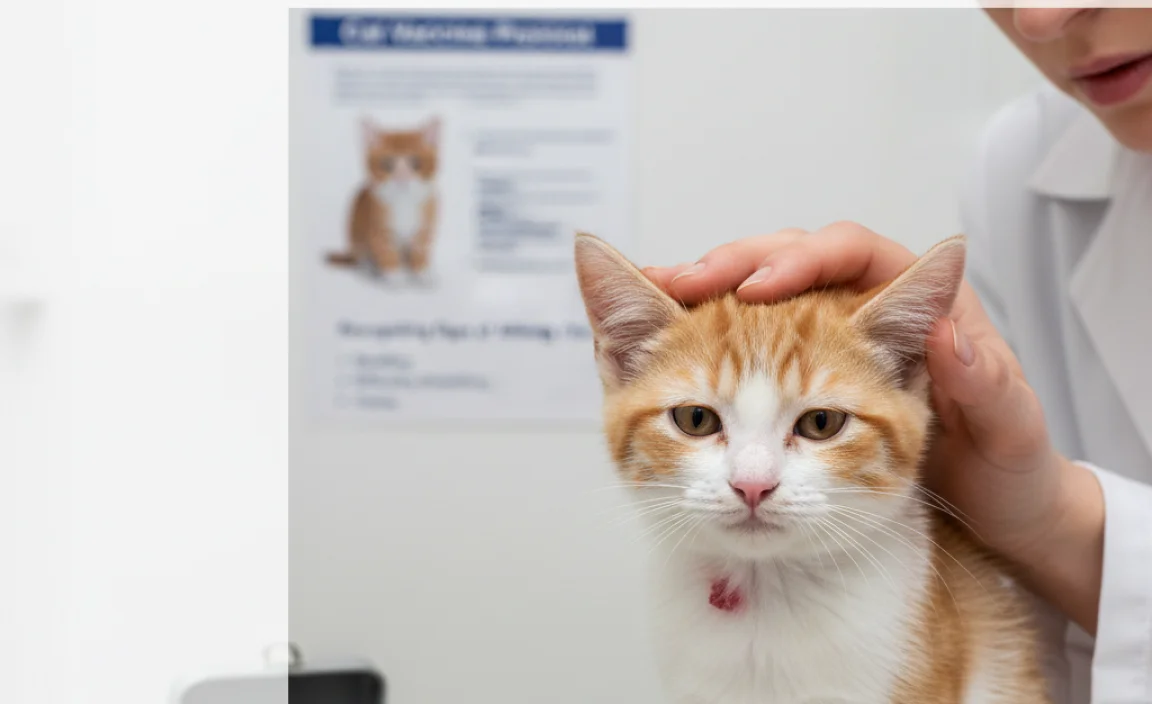
Cat vaccine safety tips include knowing allergy signs. Allergic reactions to vaccines are rare. But it is important to know what to look for. Signs of an allergic reaction can appear within minutes or hours after the vaccination. These signs can include difficulty breathing, hives, or swelling of the face. Your cat might also vomit or have diarrhea. In severe cases, they might collapse. If you see any of these signs, seek veterinary care immediately. Time is of the essence when it comes to allergic reactions. Your vet can give your cat medication to counteract the reaction. They will also monitor your cat closely to make sure they recover fully. By knowing the signs of an allergic reaction, you can act quickly and save your cat’s life.
- Watch for difficulty breathing.
- Check for hives or swelling.
- Look for vomiting or diarrhea.
- Be aware of potential collapse.
- Seek immediate veterinary care.
Remember, allergic reactions are not common. But it is always better to be prepared. Talk to your vet about your concerns. They can help you understand the risks and what to watch for. They can also provide you with instructions on what to do in case of an emergency. Keep your vet’s phone number handy. You should also know the location of the nearest emergency veterinary clinic. By being prepared, you can provide your cat with the best possible care. And you can have peace of mind knowing that you are ready to act if needed. Cat vaccine safety tips are all about being informed and proactive.
What Difficulty Breathing Looks Like
Imagine trying to breathe through a straw. That is what it might feel like for a cat having trouble breathing. Difficulty breathing can be a scary sign. It can indicate a serious problem. Signs of difficulty breathing in cats include rapid breathing, panting, or open-mouth breathing. Your cat might also be coughing or wheezing. Their gums might appear pale or blue. They might be struggling to get air. If you notice any of these signs, get your cat to a vet right away. Do not wait to see if it gets better. Difficulty breathing is a medical emergency.
Identifying Hives and Swelling
Have you ever had a rash after touching something you are allergic to? Hives are similar to that. They are raised, itchy bumps on the skin. Swelling can also occur, especially around the face and eyes. Your cat’s face might look puffy or distorted. Hives and swelling are signs of an allergic reaction. They can be uncomfortable and even dangerous. If you notice hives or swelling on your cat, contact your vet. They can recommend treatment to relieve the symptoms.
Why Vomiting and Diarrhea Are Red Flags
Think about when your stomach is upset. Vomiting and diarrhea are signs that something is wrong. They can be caused by many things, including an allergic reaction. If your cat vomits or has diarrhea after a vaccine, it is important to pay attention. If it only happens once or twice, it might not be a big deal. But if it continues or is severe, contact your vet. Vomiting and diarrhea can lead to dehydration. They can also be a sign of a serious allergic reaction. Your vet can determine the cause and recommend the best course of treatment.
Fun Fact or Stat: Cats can hide their discomfort, so observe their behavior closely for subtle signs of distress after vaccination!
Proper Post-Vaccination Care for Cats
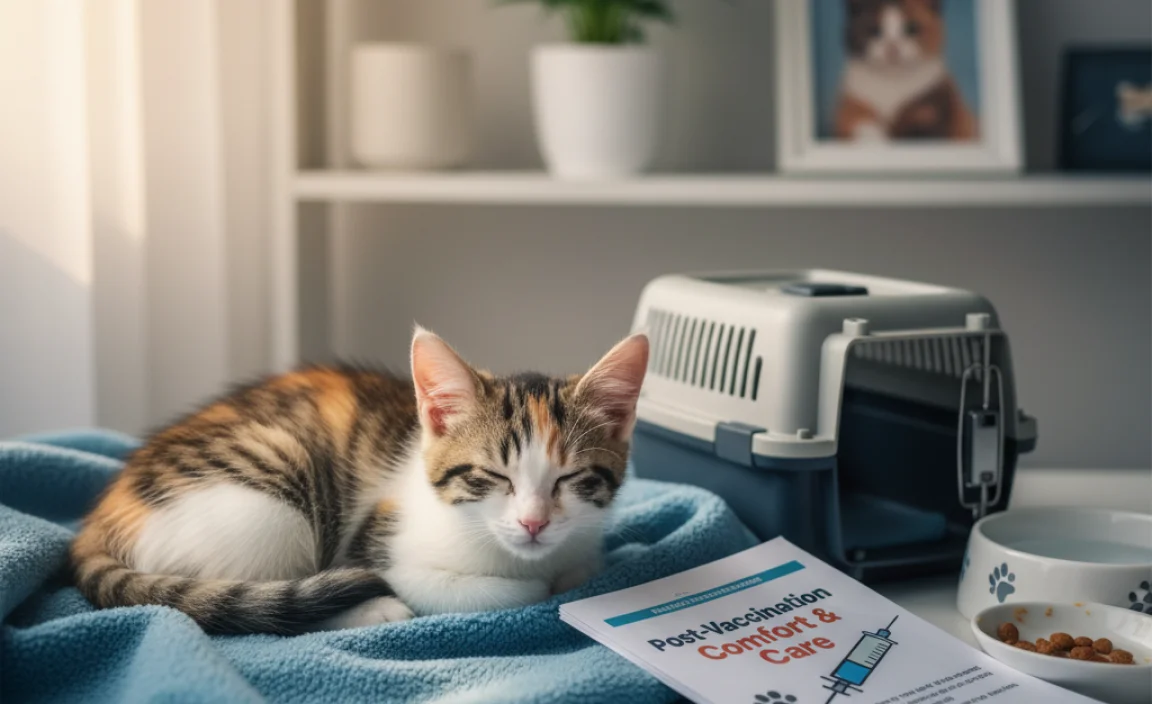
Following cat vaccine safety tips includes post-vaccine care. After your cat gets vaccinated, proper care is essential. Keep your cat indoors for a few days. This helps them avoid exposure to other illnesses. Provide them with a quiet and comfortable environment. Make sure they have access to fresh water and food. Avoid any strenuous activities. Let them rest and recover. Monitor the injection site for any signs of swelling or redness. If you notice anything unusual, contact your vet. Give your cat lots of love and attention. This will help them feel safe and secure. By following these tips, you can help your cat recover quickly and smoothly after vaccination.
- Keep your cat indoors.
- Provide a quiet environment.
- Offer fresh water and food.
- Avoid strenuous activities.
- Give lots of love and attention.
Remember, post-vaccination care is just as important as the vaccination itself. It helps your cat’s body recover and build immunity. Think of it like taking care of yourself after a workout. You need to rest, hydrate, and eat well. The same applies to your cat. By providing proper care, you can help minimize the risk of side effects. And you can ensure that your cat gets the full benefits of the vaccine. Talk to your vet if you have any questions about post-vaccination care. They can provide you with specific instructions based on your cat’s individual needs. Cat vaccine safety tips are all about being proactive and attentive.
Creating a Calm Environment
Imagine trying to relax in a noisy, chaotic room. It would be difficult, right? Cats need a calm environment to recover after a vaccine. Choose a quiet room where they can rest undisturbed. Dim the lights and minimize noise. Keep other pets and children away. Provide a comfortable bed or blanket. Use a calming diffuser or spray. These products release pheromones that can help cats feel relaxed. A calm environment promotes healing and reduces stress. It helps your cat recover more quickly and smoothly.
Monitoring Food and Water Intake
Have you ever noticed how you eat and drink less when you are not feeling well? Cats can experience the same thing after a vaccine. It is important to monitor their food and water intake. Make sure they have access to fresh water at all times. Offer them their favorite food. You can try warming the food slightly to make it more appealing. If they are not eating or drinking, try offering small amounts frequently. If they continue to refuse food or water, contact your vet. Dehydration can be a serious problem, especially in cats.
Providing Comfort and Affection
Think about how good it feels to get a hug when you are feeling down. Cats also need comfort and affection after a vaccine. Spend some quality time with your cat. Pet them gently and speak to them in a soothing voice. Offer them their favorite toys. Let them know that you are there for them. Avoid any rough play or handling. Just provide them with gentle reassurance. Comfort and affection can help reduce stress and promote healing. It can also strengthen the bond between you and your cat.
Fun Fact or Stat: Studies show that petting a cat can lower your blood pressure and reduce stress levels in both you and your feline friend!
Creating a Vaccination Schedule
A good vaccination schedule is vital to cat vaccine safety tips. A vaccination schedule helps protect your cat from diseases. Kittens need a series of vaccines to build immunity. Adult cats need booster shots to maintain protection. Your vet will create a schedule based on your cat’s age, lifestyle, and health. Core vaccines are usually given first. These protect against common and serious diseases. Non-core vaccines are given based on individual risk factors. It is important to follow the schedule closely. Missing a dose can leave your cat vulnerable to disease. Keep track of your cat’s vaccinations. Your vet can provide you with a record. You can also use a calendar or app to remind you of upcoming appointments. A good vaccination schedule is an important part of keeping your cat healthy.
| Vaccine | Kittens (Initial) | Adults (Boosters) | Frequency |
|---|---|---|---|
| FVRCP (Feline Distemper) | 6-8 weeks, then every 3-4 weeks until 16 weeks old | 1 year after initial series | Every 1-3 years |
| Rabies | 12-16 weeks old | 1 year after initial vaccine | Every 1-3 years (depending on local laws and vaccine type) |
| FeLV (Feline Leukemia Virus) | 8 weeks and 12 weeks | 1 year after initial series (for at-risk cats) | Annually (for at-risk cats) |
| Chlamydia | 8 weeks and 12 weeks | 1 year after initial series (for at-risk cats) | Annually (for at-risk cats) |
- Start vaccinations early in kittens.
- Follow your vet’s recommended schedule.
- Keep track of your cat’s vaccinations.
- Don’t miss booster shots.
- Discuss non-core vaccines with your vet.
Creating a vaccination schedule is like planning a road trip. You need to know where you are going and how to get there. Your vet is like your map. They can help you plan the best route for your cat’s health. They will consider your cat’s individual needs and risk factors. They will also stay up-to-date on the latest vaccine recommendations. Remember, vaccinations are not a one-time thing. They require ongoing maintenance. Booster shots are needed to keep your cat protected. By following a good vaccination schedule, you can help your cat live a long and healthy life. Cat vaccine safety tips are all about being proactive and responsible.
Why Kitten Vaccinations Are Crucial
Imagine a tiny baby without any protection. Kittens are similar. They are born with some immunity from their mother. But this immunity fades over time. Vaccinations help kittens build their own immunity. They protect them from serious diseases that can be deadly. Kitten vaccinations usually start around 6-8 weeks of age. They are given in a series of shots. This helps build a strong and lasting immunity. Don’t skip or delay kitten vaccinations. They are essential for their health and well-being. It’s like giving them a shield to protect them from harm.
The Importance of Booster Shots for Adult Cats
Think about getting a flu shot every year. Booster shots are similar for cats. They help maintain immunity over time. The protection from a vaccine can decrease over time. Booster shots help boost the immune system and keep it strong. Adult cats need booster shots regularly. The frequency depends on the vaccine and your cat’s risk factors. Your vet will recommend a booster schedule based on your cat’s individual needs. Don’t forget to schedule those booster appointments. They are an important part of keeping your cat healthy.
Tracking Your Cat’s Vaccination History
Have you ever lost an important document? It can be frustrating. Keeping track of your cat’s vaccination history is important. It helps you know when they are due for booster shots. It also provides important information for your vet. Keep a record of your cat’s vaccinations in a safe place. You can ask your vet for a copy of their vaccination records. You can also use a calendar or app to track their vaccinations. Having this information readily available can help ensure that your cat stays protected.
Fun Fact or Stat: Microchipping your cat can also help link them to their vaccination records in case they ever get lost!
Summary
Cat vaccine safety tips are essential for responsible pet ownership. Vaccines protect cats from serious diseases. However, it’s important to minimize risks. This includes discussing your cat’s health history with the vet. Choosing the right vaccines is also key. Monitoring your cat after vaccination is crucial. Watch for any signs of a reaction. Proper post-vaccination care helps your cat recover. Following a vaccination schedule ensures long-term protection. By following these safety tips, you can keep your cat healthy and protected.
Conclusion
Vaccinating your cat is a crucial part of pet care. Cat vaccine safety tips help ensure the process is safe. Work closely with your vet. Understand the risks and benefits. Monitor your cat after vaccination. By being informed and proactive, you can protect your furry friend. You can help them live a long and healthy life. Remember, your cat’s health is in your hands. Following cat vaccine safety tips makes a big difference.
Frequently Asked Questions
Question No 1: Why are vaccines important for my cat?
Answer: Vaccines are very important because they protect your cat from dangerous and sometimes deadly diseases. They work by helping your cat’s body build defenses against these diseases. Think of it like giving your cat’s body a practice run for fighting off real infections. Without vaccines, your cat is at a much higher risk of getting sick. Core vaccines, like those for rabies and feline distemper, are especially important for all cats. They prevent diseases that are common and can cause serious health problems. Following cat vaccine safety tips ensures your cat gets the protection they need with minimal risk.
Question No 2: What are the common side effects of cat vaccines?
Answer: Most cats experience only mild side effects after getting vaccinated. These side effects are usually temporary and go away within a day or two. Common side effects include feeling a little tired or having a slight fever. Your cat might also have some soreness or swelling at the spot where they got the shot. Some cats might not feel like eating as much for a short time. These side effects are a sign that the vaccine is working and your cat’s body is building immunity. Serious side effects are rare, but it’s important to watch your cat closely after vaccination.
Question No 3: How can I minimize the risk of vaccine reactions in my cat?
Answer: You can do several things to minimize the risk of vaccine reactions. Always discuss your cat’s health history with your vet. Make sure they know about any allergies or past reactions. Ask your vet about splitting vaccines, which means giving different vaccines at separate appointments. This can reduce the stress on your cat’s immune system. Keep your cat calm and comfortable during and after the vaccination. Watch for any signs of a reaction, such as difficulty breathing or swelling. Following these cat vaccine safety tips can help ensure your cat has a safe and positive experience.
Question No 4: What should I do if I think my cat is having an allergic reaction to a vaccine?
Answer: If you think your cat is having an allergic reaction to a vaccine, it’s important to act quickly. Allergic reactions can be serious and even life-threatening. Signs of an allergic reaction include difficulty breathing, hives or swelling, vomiting, or diarrhea. In severe cases, your cat might collapse. If you see any of these signs, get your cat to a vet immediately. Time is of the essence. Your vet can give your cat medication to counteract the reaction and monitor them closely. Knowing the signs and acting fast can save your cat’s life. The cat vaccine safety tips emphasize being prepared for such emergencies.
Question No 5: How often does my cat need to be vaccinated?
Answer: The frequency of vaccinations depends on several factors. These factors include your cat’s age, lifestyle, and the type of vaccine. Kittens need a series of vaccines to build immunity. Adult cats need booster shots to maintain protection. Your vet will create a vaccination schedule based on your cat’s individual needs. Core vaccines, like those for rabies and feline distemper, are usually given every 1-3 years. Non-core vaccines might be given more or less often depending on your cat’s risk factors. It’s important to follow your vet’s recommendations and keep track of your cat’s vaccinations.
Question No 6: Are there any alternatives to traditional cat vaccines?
Answer: While traditional vaccines are the most common and well-studied method of protecting cats from diseases, some alternatives are being explored. These include titer testing, which measures the level of antibodies in your cat’s blood to see if they are still protected from a previous vaccination. However, titer testing is not always reliable for all diseases. Some holistic vets may offer alternative therapies, but their effectiveness is not always scientifically proven. It’s important to discuss all options with your vet and make an informed decision based on your cat’s individual needs and the best available evidence. Always prioritize cat vaccine safety tips when considering any alternative approach.

